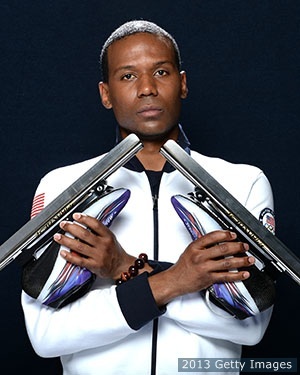1 October 2013 – Milwaukee, USA
On the threshold of another Olympic season, all-world speedskater Shani Davis isn’t deviating from the recipe that has enabled him to convert effort into gold for the past decade.
Widely considered the most successful middle-distance skater in his sport’s history, Davis enters the 2013-2014 campaign with an opportunity to go where no male speedskater has gone before: win a gold medal at three consecutive Olympic Winter Games. No male U.S. Olympian – in any winter sport – has accomplished that trifecta.
And if everything goes according to plan, in Sochi this February Davis will get two bites at that golden apple as he aims to defend his 1000 meter Olympic crown for the second consecutive Games and tries to win the 1500 meter race in which he has twice earned Olympic silver.
Coming of an injury-slowed 2012-13 season, Shani is particularly eager to regain the form that has garnered him 10 world championship titles and 53 World Cup wins. A rigorous planner, Davis is leaving nothing to chance nor resting on his well-earned laurels as he returns to his Fall training base in Milwaukee at the Pettit National Ice Center, where he prepares without distraction for the start of the upcoming season, which begins Oct. 26 in Salt Lake City with the U.S. Single Distance Championships.
During a break from intense training, Shani engaged in some Q & A for shanidavis.org:
Q: Was anything different in your preparation this year?
SD: Mostly the same preparation, which focused on short track training with the national team in the summer [in Salt Lake City] and then a shift to long track before the season begins, which is where I am now [in Milwaukee]. I know it’s important to stay healthy so I try to take recovery even more seriously than in years past, scheduling extra massages and doing extra core and flexibility stuff. I try not to take for granted the amount of time I have to get ready so that I can capitalize on every moment and opportunity I had over the course of the summer to prepare myself for this important season.
Q: What are your main skating goals to start the season?
SD: Well, last fall I got injured right before the first World Cup and I never knew how truly strong I was all season long. Now that I’m healthier and moving forward I’m eager to return to the world circuit this fall to see where I fit in. From there I’ll take it one step at a time and try to get in the best possible shape physically and mentally for the remainder of the season, especially leading up to the Olympic Games.
Q: What will make for a successful season?
SD: Most important would be staying healthy, not taking myself out of the game before it even begins. The season is long and not going ‘all in’ too soon is also important. The biggest races are in February so timing is everything. Having the self-discipline to stick to my plan and see it through will be critical. Really, if I can be at the top of my game when I get to Sochi in February, then I’ve already succeeded. Putting myself in position to win, whether I do or not, is the main thing right now.
Q: What will be important when you get to Sochi, both on ice (racing) and off?
SD: After qualifying, I will prepare myself for the things I recall from previous Olympics. Navigating mixed media zones and adapting to the ice will be the most challenging since everyday those elements can change. The main thing will be to get into the rhythm of the Olympics as soon as I can and make sure my battery is fully charged for the job. The rest should be a blast and I’m really looking forward to it!
Q: Do off-ice opportunities (sponsors or media) empower or distract from your preparation?
SD: Time will tell! I’m much better prepared for the attention and demands that come with being an Olympic Champion, and I’ve been in a good place with media and sponsors for the last four years. I also have a strong support system, which makes it much easier to handle all of the off-ice stuff. This off-season has definitely been busy for me, busier than leading up to Vancouver. Like anything, the important thing has been to find the proper balance so that it doesn’t interfere with what I’m still training for. I think I’ve been able to do that, and I’m satisfied with my decisions regarding [taking advantage of] those opportunities, which I appreciate have come to me as a direct result of all my hard work and dedication. I try to do what I can while I can because once the season gets close I won’t allow myself to be taken away from my first priority, which is preparing for the championships.
* * *

